BOOKS FOR YOU TO READ
AND DOWNLOAD
- LUTHER'S PROTEST by M. S. Thirumalai
- TELL ME IT'S TRUE ...
A Book Of Poems by Stan Schmidt - SOMETHING IS GREATER THAN WONDERS...
A Book Of Poems & Free Verses by Pastor Harold Brokke - GEMS OF TRUTH by Stan Schmidt
- WHERE IN THE WORLD IS GOD? by Alec Brooks
- LIGHT OF THE WORLD, an Original Screenplay by W. G. Orr
BACK ISSUES
SEND YOUR ARTICLES FOR PUBLICATION IN Christian Literature Today.
- E-mail your articles and book-length reports to thirumalai@bethfel.org or send it by regular mail to:
M. S. Thirumalai, Ph.D.
6820 Auto Club Road #320
Bloomington, MN 55438 USA - Your articles and booklength reports should be written, preferably, following the MLA Stylesheet.
- The Editorial Board has the right to accept, reject, or suggest modifications to the articles submitted for publication, and to make suitable stylistic adjustments. High quality, academic integrity, ethics, and morals are expected from the authors and discussants.
Copyright © 2001
M. S. Thirumalai
THE SPIRIT OF JANETTE OKE'S NOVELS
M. S. Thirumalai
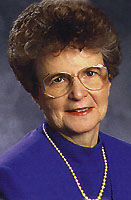
1. JANETTE OKE - A POPULAR NOVELIST
Millions have enjoyed reading Janette Oke's novels for almost three decades now. She has impacted the lives of many through her fiction. I had some opportunity to read some of the letters Bethany Fellowship Prison Ministry receives every day. The prisoners seeking light at the end of the tunnel write how they have been touched in their hearts and spirits by the wonderful novels written by her. All this is achieved without any overt moral preaching in her novels. Just a desire to pray for others, just a desire stated by the characters that the lives of the unfortunate would be changed by God and that these would come to know God …
In this short paper I would like to view Janette Oke's novels from a literary point of view, cull out some of the hidden unity of purpose, detail the elegance and finesse with which the stories are woven, and record the literary and spiritual growth of the theme, narration and scope of her novels. I would like to place these novels in the background of what Christian fiction is.
2. THE WORTH OF A NOVEL
A lay reader intuitively recognizes and enjoys the worth of a novel she reads, but a critical reader discovers the why and how of the entire experience of reading a good novel and lays the same before others for a heightened experience. Moreover, fiction writing is a deliberate act. When this deliberate act is conjoined with a purpose higher than mere story telling, very many strategies and techniques are adopted as well as created by the author, primarily to strike a balance between the story itself and all it contains, and her own intent in creating the story. In this process one or the other element gets more magnified and this gives the distinct aroma to a specific work and the author.
3. JANETTE OKE INVENTING AND RE-INVENTING HER WORLD
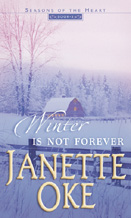
The fact that Janette Oke has published many novels and is actively inventing and re-inventing her world adds an interesting dimension of growth, choice, and specialization not only to her works, but also to her own self. An author with a purpose, Oke extends her horizon by the multiplicity of events and characters, even as she specializes in selecting the values she chooses to express. She revels in the past of the West and the Frontier, but only to make it relevant to the present and the future. The locale and the language, the attire and the action, specific to the West and the Frontier, recede to the background, once a diligent reader begins her literary journey. In the stillness of the stories of the West and the Frontier, the torrential currents of the present are brought home indirectly.
4. ABSENCE OF VIOLENCE
Significantly lacking in violence, a trait often, and unnecessarily, associated with the Western genre, Oke's novels would speak of the ordinary multitudes in their extraordinary simplicity of faith, love and work. But, then, while the folks are simple, their stories are not. For example, her first novel Love Comes Softly begins with an audacious marriage of convenience. Choosing for her portrayal young and tender age subjects on the brink of exploding into adulthood, Janette Oke recaptures the growth of the reader! With the past one identifies the present in many dimensions!
5. SPIRITUAL GROWTH AS THE GOAL: TIME BECOMES THE CANVAS
In almost all her novels, growth occupies the mind of Janette Oke. The blossoming of the individual character to his or her potential fascinates her. Focus on growth is perhaps the reason some of the librarians tend to classify her novels as Young Adult Fiction, while the publisher would call it just fiction or inspirational, religious or historical fiction. It is not the age of the characters that counts, it is where they arrive at and how they arrive there that counts.
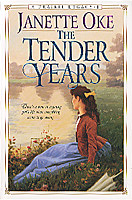
Time becomes the canvas, but the growth is what is drawn on it. Time, however, is compartmentalized into different ways: Whereas the Love Comes Softly series is a generational fiction, the Canadian West Series tells the story of a single generation. On the other hand Seasons of the Heart focuses on the growing up of a young child. Love Comes Softly series embraces the story of a pioneering society, the Canadian West Series embraces a generation within the society, and Seasons of the Heart breaks through both generation and society to focus on an individual.
6. FOCUS OF THE SERIES
The series are all concurrent in some sense, especially because they share the unexpected locales and challenges presented by this factor, and the times. However, each one of these consists of different and distinctive strands. Love Comes Softly and Canadian West are series narrated in the third person, whereas the Seasons of the Heart is narrated in the first person, each offering its own peculiarities in narration, unfolding of events, and characterization. What the person sees is an intimate and often involved event, almost to the point of ignoring the significant other. What the third person sees is more global and panoramic, and yet is constrained by the width of vision!
7. THE SERIES VERSUS SINGLES
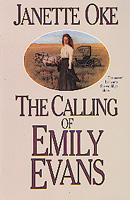
There is yet another interesting dimension: the opposition between the Series and the Singles. The external locale, movement/sequence of events, and the good fights given to meet the challenges of the times dominate the Series. On the other hand, the Singles, having all the above features, come to focus more on the mysterious goings on and the doubts in the heart of the individual characters about their own goodness and the goodness of the people around. There is a greater sense of abstraction and elevation in the Singles than in the Series. Again the Singles are generally the individuals' specific psychological developmental schedules and thus they lend themselves for such a treatment. For the author also it is a move from the outward social happenings toward the inward (spiritual) growth problems of the individuals. At least in one novel, the critic is tempted to assume that Janette Oke talks of her own personal decision making process: Is The Calling of Emily Evans a portrayal of what she went through in her young days - to make crucial decisions to serve the Lord in whatever capacity He asked her to serve Him? What about the other decisions her characters had to take in carrying forward their lives in harmony with what God wanted them to do through His Word?
8. THE FOCUS OF THE SINGLES

The Singles are called the Women of the West series; in reality they are connected with one another only in their psychological moves, not their story sequencing. It is a very significant milestone in Janette Oke's creative writing: It is a reflection of the freedom Janette Oke has now found for herself as a creative writer. The creative writer has broken into the open, fully free to create, not fettered by the Series mold. In an amazing way the backdrop she established for the Series facilitates this onward march, for this to move from one locale to another, from one psychological interior to another, and to focus on the individual. The interior of the heart in harmony or disharmony with the exterior world becomes a major focus. Striving towards perfection of the self becomes a dominant feature. Self-correction to move towards what God ordains is highlighted. Forgiveness and justification by faith become more and more pronounced. Seeking out children and others who need comfort and care, and guidance in their moment of confusion, and many other crucial points. The didactic truth is clearly hidden, and the individual character offers her life to us as the model of the problems faced by us in the present.
9. SIMPLICITY HIDES THE COMPLEXITY
When one reads any novel by Janette Oke, one is struck by the fact of its simplicity, almost to the point of being utterly plain and straightforward. And yet one likes it and wants to go back to it. These apparently contradictory postures cannot be explained unless one takes a closer look into the methods and techniques of narration employed by Janette Oke. Validity and relevance of moral truth presented in a work alone is not a sufficient motivating ground for one to go back to a work of fiction. Moral truth can be obtained in abundance in non-fiction. Again the story and locale are not also sufficient grounds for this move of the reader. They are necessary but not sufficient. When the methods and techniques of narration are combined with the above, as in Janette Oke, a person becomes a loyal reader, and begins to read and r-read what is offered to her.
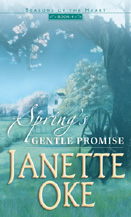
In the façade of simple diction and simple syntax, Oke is able to hide the sense of suspense and wonder she creates in her reader! Consider, for example, her technique of introducing a character in any of her novels. Or consider the appropriateness of the use of colloquialism and spoken spelling for the character she portrays. Consider the choice of diction for the occasion and the character. Consider the deliberately twisted sequencing of events, and the frankness and openness of mental conversations. Consider the moments in which her characters decide for sure what they want to do. Consider Oke's suggestive expressions, especially when these relate man-woman relations. Every novel is full of characteristics that would distinguish it from others; at the same time, one also notices a pattern of author's perception, narration, and language running through all of Oke's novels. It is her ability to make her readers feel that some part of their own being is presently narrated, or in making them long to be part of what is narrated that Janette Oke finds her great success. And she becomes a master of the process of catharsis! The end result, however, is not one of passivity, but a determination in favor of self-correction.
10. NOT A WORLD OF PASSIVITY
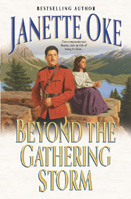
The world of Janette Oke is not, indeed, a world of passivity; it is certainly a world of quietude, and action in stillness even with that ever present north wind and the blizzard! And the readers would declare, imitating Josh in Once Upon a Summer, "Funny how one feels it quiet, even though there isn't a still moment down the crik."
ENEMY OCCUPATION | THE OPENNESS OF GOD AND CREATIVE WRITING | LUTHER'S PROTEST | ABANDON AND OTHER POEMS | WHO'S IN CONTROL, YOU OR CHRIST? | THE SPIRIT OF JANETTE OKE'S NOVELS | MONTE CRISTO AND SALVATION FROM END TO BEGINNING | HOME PAGE | CONTACT EDITOR
M. S. Thirumalai
Bethany College of Missions
6820 Auto Club Road, Suite C
Bloomington, MN 55438, USA
E-mail: thirumalai@bethfel.org.